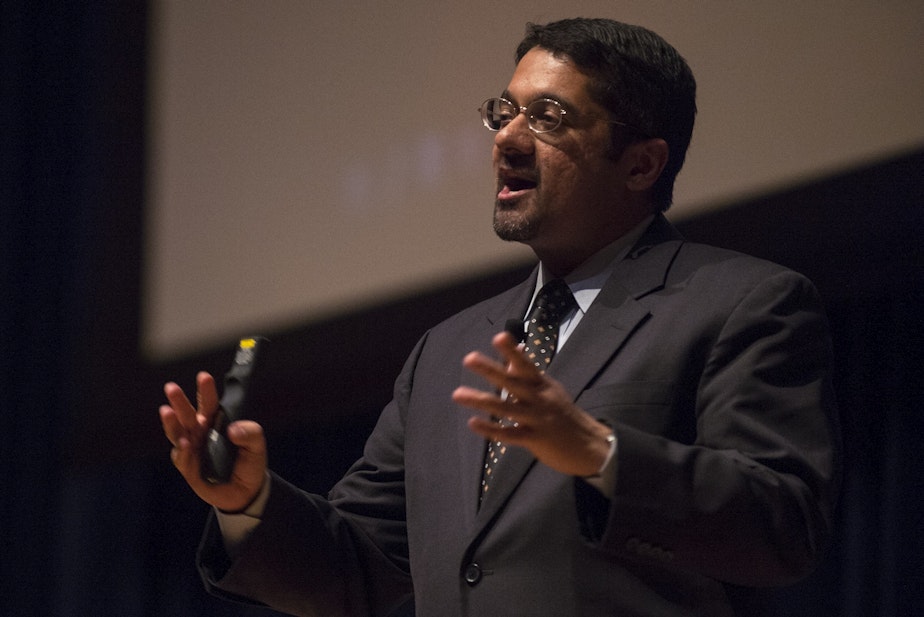You’re compassionate, so why aren’t you helping homeless people? Shankar Vedantam explains

This is Shankar Vedantam’s interview with Kim Malcolm, which was so good we transcribed it (lightly edited for clarity).
When we think about 11,000 people who are homeless, and we ask ourselves what we could do to help, the answer is nothing, unless your name is Jeff Bezos.
Helping 11,000 people would cost many millions of dollars. It's not within your capacity to help that many people.
Psychologically, though, we might be willing to help one person. But when we're confronted with the knowledge that there are 11,000 people who need our help, we lose the ability to help the one person we can help.
That’s why many people who can do something often stand back. It's not because they are unable to do something; they say if I can't fix the whole problem why should I try?
Human beings are wired to feel compassion. You can do experiments with pre-verbal infants and you will find that pre-verbal children — who haven't been to school, who can't speak — if you give them an opportunity to share with someone else, they seem happier.
Sponsored
Something about the willingness to be part of a community, to give of your own, to make someone else happy; you don't have to be taught this to know that it's a good thing. We are wired to feel like it's a good thing.
Given that we have this predisposition to be pro-social, as the researchers would say, why is it so often we don't act in pro-social ways? I am fascinated by all these psychological mechanisms that prevent us from doing what comes very naturally to us.
The philosopher Peter Singer had a thought experiment many years ago. He said imagine you're walking by the side of a pond, and you see a child drowning in the pond. The child is in relatively shallow water, so you could jump in and save the child's life at no risk to your own.
But you're wearing a nice pair of shoes that cost $200. If you start to untie your shoes, the child will drown. You must choose: Do you save your shoes or the life of the child?
Nearly everyone says they would jump in the pond, because a child's life is more important than a pair of shoes.
Sponsored
But Peter Singer then asks a provocative question. He says, “Well if that's the case, why don't you take out your checkbook and write a check for $200 to Doctors Without Borders, and they can set up care for someone halfway around the world, and $200 might indeed save someone's life?”
It's the same moral dilemma: Do you prefer to keep your $200, or do you prefer to save someone's life? Why is it that when the person drowning is right in front of us, we feel compelled to act? Almost every one of us would say the child's life is worth more than a pair of shoes.
But when the person is distant from us, there is a diffusion of responsibility. We say, why is this my problem? Why isn't this someone else's problem? Why isn't the problem with the person who is sitting next to the child in that part of the world?
We distance ourselves from the problem and by distancing ourselves from the problem we lose the ability to act empathetically.
So. Say I decide to take a more compassionate attitude towards this problem. What can I do?
Sponsored
I can get to know one homeless person.
In one of the early episodes of Hidden Brain, we featured a woman Kellie Gillespie, who befriended a homeless man, learned his story, and invited him to have a cup of coffee with her.
She discovered that he had become estranged from his parents, which is why he had left his parents’ home, and now he was homeless.
Kellie Gillespie did something that almost all of us can do: She picked up her phone and called his mother and said, “I'm Simon's friend, would you like to know how he's doing?”
And within five seconds, the woman at the other end of the line is weeping because she hasn't heard from her son in three years; she's not sure if he's alive or dead.
Sponsored
Kellie Gillespie hands the phone to Simon. Simon has a conversation with his mother, and Kellie Gillespie takes Simon to the bus station, buys him a ticket, and puts him on a bus to go back home.
Now, this is a story that has a relatively simple solution, because there was a home that Simon could go back to, and many problems are not as simple as that.
But what would it take to give your phone to someone for five minutes to make a phone call? When you are homeless, you might not be able to access a phone. Do homeless people have people they would like to call? Would they have people to whom they would like to wish happy birthday? Would they have people to whom they would like to say, I'm sorry that your aunt passed away?
The little things we can do allow us to see the problem through the lens of humanity, as opposed to the lens of statistics. When we look at the problem statistically, it's overwhelming, it's upsetting, it's aggravating.
When we look at it through the lens of the individual person, it's uplifting and in some ways it's very energizing.
Shankar Vedantam is the host of Hidden Brain, a weekly show from NPR. The transcript of this interview was lightly edited for clarity.
Produced for the web by Isolde Raftery.


